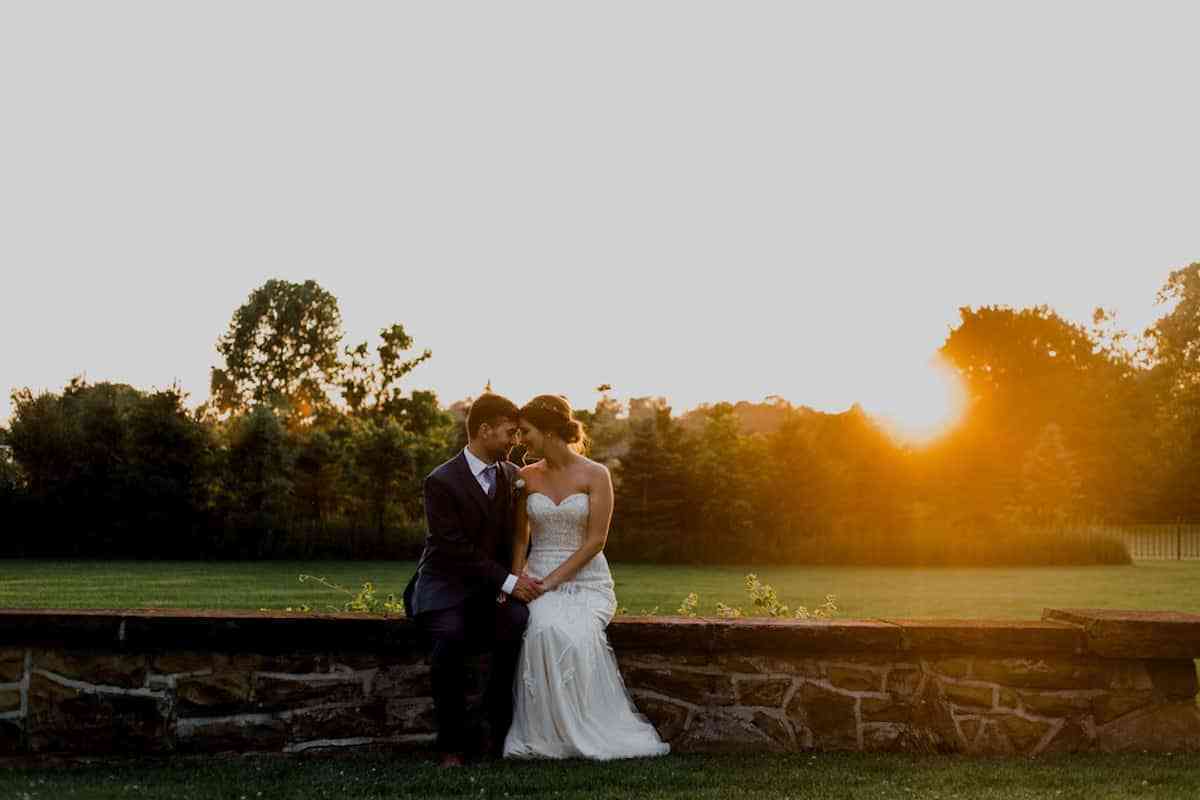- Expert advice/
- Wedding planning 101/
- Wedding planning questions/
- Planning an Elopement: A Comprehensive Guide for the Perfect Getaway
- Wedding planning questions
Planning an Elopement: A Comprehensive Guide for the Perfect Getaway
A step-by-step guide on how to elope. We cover everything from choosing your witness to picking the location, so you don’t have to stress about a thing.
Last updated October 13, 2025

TLDR
- Eloping can be close to home or far away as long as you choose a location that speaks to the two of you.
- Set a budget, choose a location, and also research any legal requirements in your destination.
- Include family and friends virtually, have a small guest list, or celebrate post-elopement with loved ones at home.
Considering an elopement? Perfect! It’s an exciting and intimate way to celebrate your love in a different place. Whether you're dreaming of a secluded beach ceremony or a mountaintop micro wedding, eloping creates a wedding day that's truly your own. Ready to begin? Here’s everything you need to know to plan the perfect elopement.
What is an elopement?
Traditionally, eloping meant running away to get married in secret. However, nowadays, the definition has evolved to encompass intimate weddings with a low guest count, often in a picturesque or meaningful location. Elopements also allow couples to focus on what matters most - their commitment to each other. Another plus is that you won’t have the stress and expense of a large traditional wedding.
Key characteristics of modern elopements include:
- Intimate ceremony with few or no guests
- Focus on the couple's preferences
- Often held in destination locations
- More flexibility in planning
- Can be more budget-friendly than traditional weddings
Why choose to elope?
There are many reasons couples opt for elopements over traditional weddings:
- Intimacy: Elopements allow couples to fully focus on each other without distractions.
- Lower stress: With fewer logistics, the planning process can be more enjoyable.
- Budget-friendly: Elopements are often less expensive than large weddings.
- Flexibility: Couples have more freedom to customize their special day.
- Adventure: Elopements can incorporate unique experiences (and travel!).
If any or all of the reasons above appeal to you, it may be time to elope—or at least to consider it.
Key steps to planning your elopement
Depending on the amount of effort you put into your elopement—of course, there’s a big difference between whisking off to a Las Vegas wedding chapel and having a micro wedding with guests—there are several elements to consider.
Choosing your elopement location
One of the most exciting aspects of planning an elopement is choosing a location. Whether you envision saying "I do" on a tropical beach, in a charming European village, or atop a majestic mountain, the possibilities are endless.
Here are factors you should consider when choosing your elopement destination:
- Atmosphere
- Accessibility and travel requirements
- Climate
- Legal requirements for getting married
- Costs associated with the location
Looking for popular elopement destinations? Depending on the type of wedding you and your partner want, here are a few that rank high.
- Beaches - Bali, Hawaii, Maldives
- Mountains - Colorado Rockies, Swiss Alps, New Zealand
- Cities - Paris, New York, Las Vegas
- National Parks - Yosemite, Banff, Glacier
Once you've narrowed down your options, research specific venues within your destination. Many locations offer elopement packages (with planners!) that can simplify the planning process.

Setting a date and budget
Once you pick your location, you can pick a date and set your elopement budget. Here’s what you need to consider:
- Ideal weather at your chosen location
- Any significant dates for you as a couple
- Travel costs and peak seasons
- Availability of key vendors
While elopements are often more affordable than traditional weddings, costs can still add up. Create a detailed budget that includes:
- Travel
- Accommodations
- Ceremony costs (venue fees, officiant, marriage license)
- Attire
- Wedding rings
- Photography and videography
- Flowers and other decorations
- Post-elopement celebration (if desired)
Using a budgeting tool like the one offered by Zola can help you track expenses and stay on target. Don’t forget to build in a buffer for unexpected costs.
Navigating legal requirements
One crucial aspect of planning an elopement is understanding the legal requirements. Research the following for your wedding destination (even if you’re getting married close to home):
- Marriage license requirements and waiting periods
- Residency requirements (if any)
- Necessary documentation (birth certificates, passports, etc.)
- Officiant requirements
- Witness requirements (some locations require witnesses, even for elopements)
If you're eloping internationally, you may need to consider:
- Passport and visa requirements
- Whether your marriage will be legally recognized in your home country
- Potential need for translation services
It's advisable to consult with a local wedding planner or the relevant government offices to ensure you have all the necessary information and documentation for a legally binding ceremony. If legalizing your union is prohibitive, you can get married at home and have a symbolic ceremony in your destination of choice.
Planning your elopement: a step-by-step guide
While elopements are often seen as spontaneous affairs, a little preparation ensures your special day is everything you've dreamed of.
1. Choose a location that suits you as a couple.
Elopements offer the freedom to choose virtually any location that speaks to you as a couple, no matter where you choose to go. When considering potential locations, keep these factors in mind:
- Accessibility: How easy is it to reach the location? Will you need special transportation or permits?
- Weather: Research typical weather patterns for your chosen date to avoid any unpleasant surprises.
- Legal requirements: Ensure you understand the marriage requirements for your chosen destination.
- Privacy: If seclusion is crucial to you, look for locations that offer an intimate setting.
- Scenery: Consider what kind of backdrop you want for your photos.
Your elopement location should reflect your personality and relationship. Don't be afraid to think outside the box and choose a place that resonates with you both.
2. Research the legal considerations (and do the paperwork.)
While the idea of spontaneously eloping might sound romantic, it's crucial to ensure your marriage is legally recognized. Legal requirements can vary significantly from place to place, so doing your research well in advance is essential.

Here's a general checklist of legal considerations to keep in mind:
- Marriage license: Obtain the necessary license from the appropriate local authority.
- Waiting periods: Some locations require a waiting period between obtaining the license and the ceremony.
- Officiant requirements: Ensure your chosen officiant is legally authorized to perform marriages in your selected location.
- Witnesses: Determine if witnesses are required and how many.
- Documentation: Bring all necessary identification and documents, such as birth certificates or passports.
- Name changes: If either partner plans to change their name, research the process for your location.
Keep in mind that requirements can change. Always double-check with the local authorities or consider hiring a local wedding planner familiar with the legalities of your chosen destination. To help you navigate the legal landscape, here's a comparison of marriage requirements in some popular elopement destinations:
- Las Vegas, NV - no waiting period, no witnesses, no residency requirement
- Hawaii - no waiting period, one witness, no residency requirement
- New York City - 24-hour waiting period, one witness, no residency requirement
- Scotland - 29-day waiting period, two witnesses, no residency requirement
- Bali, Indonesia - 10-day waiting period, two witnesses, no residency requirement
3. Create a timeline for your elopement.
Having a loose timeline can help ensure you don't miss out on any special moments. Your elopement day is about celebrating your love, so allocate time for the experiences that matter most to you.
Here's a sample timeline for a sunrise elopement:
- 4:00 AM - Wake up and start getting ready
- 5:30 AM - First look and couple portraits
- 6:30 AM - Hike or travel to ceremony location
- 7:00 AM - Ceremony begins as the sun rises
- 7:30 AM - Post-ceremony portraits
- 9:00 AM - Celebratory breakfast or brunch
- 11:00 AM - Adventure activities or relaxation time
- 6:00 PM - Sunset dinner to cap off the day
This is just an example. Your timeline should reflect your preferences and the logistics of your location. The beauty of eloping is flexibility!
4. Personalize your ceremony.
One of the greatest advantages of eloping is the freedom to build your ceremony. You can infuse your ceremony with personal touches without the pressure of adhering to traditional wedding norms.
There are no rules when it comes to personalizing your elopement. You have the freedom to be creative and incorporate whatever elements you wish. Consider these ideas to personalize your elopement ceremony:
- Write your vows: Take the time to express your love and commitment in your own words.
- Incorporate meaningful rituals: Whether it's a handfasting ceremony, a unity candle lighting, or a tradition from your cultural background, include rituals that resonate with you.
- Choose significant music: Select songs that hold special meaning.
- Include loved ones virtually: If it’s just the two of you, consider ways to involve family and friends from afar, such as live-streaming the ceremony.
- Exchange personal gifts: Surprise each other with small, meaningful gifts before or after the ceremony.
- Create a time capsule: Write letters to each other to be opened on a future anniversary.
5. Capture the moment through photos and video.
While elopements are intimate affairs, many couples still want to document their special day. Investing in quality photography and videography can help relive your elopement and share the experience with loved ones who couldn't be there.
When choosing a photographer or videographer for your elopement, consider these factors:
- Style: Look for professionals whose aesthetic aligns with your vision for the day.
- Experience: Opt for someone familiar with elopements and your chosen location.
- Packages: Ensure their offerings match your needs, whether that's a few hours of coverage or a full-day adventure.
- Personality: You'll spend a significant portion of your day with this person, so make sure you click.
To make the most of your elopement photography, consider these tips:
- Schedule ample time for portraits in various locations
- Discuss must-have shots with your photographer in advance
- Consider a "first look" moment before the ceremony
- Don't forget to capture the small details, like your rings or special heirlooms
- If possible, plan your ceremony around the best lighting conditions
6. Celebrate after your elopement ceremony.
It’s still appropriate to celebrate with friends and family after you elope. Many couples have a post-elopement celebration immediately after the ceremony or upon returning home.
Here are some ideas for post-elopement celebrations:
- Intimate dinner: Enjoy a romantic meal at a special restaurant or have a private chef prepare dinner at your accommodation.
- Adventure activities: To cap off your day, plan exciting activities like hiking, snorkeling, or hot air ballooning.
- Reception with loved ones: Host a casual gathering or formal reception with family and friends after you return.
- Announcement party: Throw a party to announce your marriage.
- Symbolic ceremony: Have a symbolic ceremony or vow renewal with family and friends present.

How to create a feasible budget for your elopement
Like any event, creating and sticking to a budget is essential. Here's a breakdown of potential costs to consider when planning your elopement. These are rough estimates and can vary significantly depending on your location and choices.
- Travel and Accommodation: $1,000 - $5,000+
- Attire and Accessories: $500 - $3,000+
- Photography/Videography: $1,500 - $5,000+
- Officiant: $200 - $1,000
- Flowers and Decor: $200 - $1,000
- Rings: $500 - $5,000+
- Marriage License: $50 - $200
- Post-Ceremony Celebration: $500 - $3,000+
FAQ about eloping
Q: Is eloping legal? A: Yes, eloping is legal as long as you follow the marriage laws of your chosen location.
Q: Do we need witnesses to elope? A: This depends on where you’re getting married. Some places require witnesses, while others don't.
Q: Can we still have a wedding party if we elope? A: Absolutely! Many couples choose to include a small wedding party in their elopement.
Q: How do we announce our elopement to family and friends? A: You can send out elopement announcements, host a post-elopement celebration, or share your news personally with loved ones.
Q: Can we elope now and have a traditional wedding later? A: Yes, many couples choose to have a symbolic ceremony or reception with family and friends after eloping.
Embrace your love story
Remember, your elopement is a reflection of your unique love story. No matter where you roam, what matters most is that you're celebrating your commitment to each other in an authentic way.
As you embark on this exciting journey, don't hesitate to contact elopement specialists or experienced vendors who can guide you. Your perfect elopement awaits – it's time to start planning your adventure!
- National Park Service, information on eloping in US National Parks
- Lonely Planet, travel guides for destination elopements
- Zola, wedding planning tools and registry
Up next for you

24 City Hall Wedding Ideas for Your Perfect Day
How-To
Want a stylish city hall wedding but have no idea where to start? Use our list of 24 intimate wedding ideas to make this special day truly special.

We're Eloping—Can We Still Make a Wedding Registry?
Advice
Eloping is a wonderful and intimate way to celebrate your love and get married. If you're wondering if you can still make a registry, read on. Here's all the etiquette advice around registries and elopements.

How to Stop Others from Taking Over Your Wedding Planning
How-To
Zola is here to help you navigate potential pre-wedding fights so that you can stop others from taking over your wedding planning.

Destination Wedding Cost + Tips to Cut Costs
Inspiration
Average honeymoon cost is $5,300 per couple; see how destination, trip length, and season shape your spending and get planning tips to stay within budget.
Featured

Average Cost of Weddings in 2025: Vendor Price Guide
Advice
Average cost of weddings in 2025: See national averages for venues at $8,573 and catering at $6,927, plus key vendor costs to plan your budget.

30 Eco-Friendly Wedding Ideas for a Sustainable And Low-Cost Celebration
Wedding Day
Green weddings are celebrations that focus on sustainability. Learn how you can easily throw an eco-friendly ceremony and reception with these decor, food, and fashion tips.

5 Effective Ways to Fight Wedding Planning Stress
How-To
Weddings are fun, but planning them can be stressful. Here are practical ways to deal with wedding planning stress.

29 Ways to Cut Wedding Costs
Budgeting
Need to cut wedding costs? Here are five ways to do so that you might not have thought about. Read up, and get ready to spend smart!
- Expert advice/
- Wedding planning 101/
- Wedding planning questions/
- Planning an Elopement: A Comprehensive Guide for the Perfect Getaway
Find even more wedding ideas, inspo, tips, and tricks
We’ve got wedding planning advice on everything from save the dates to wedding cakes.
